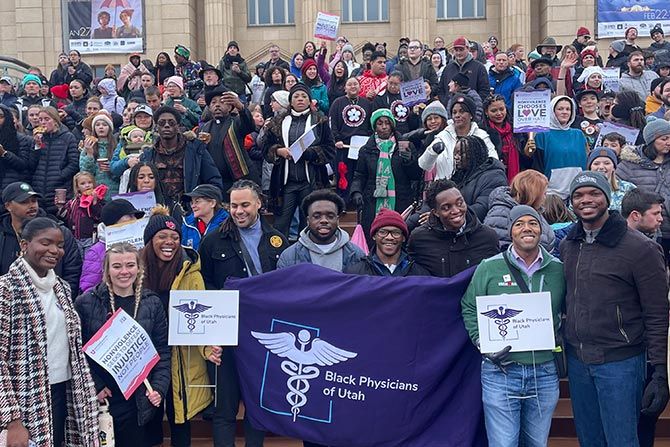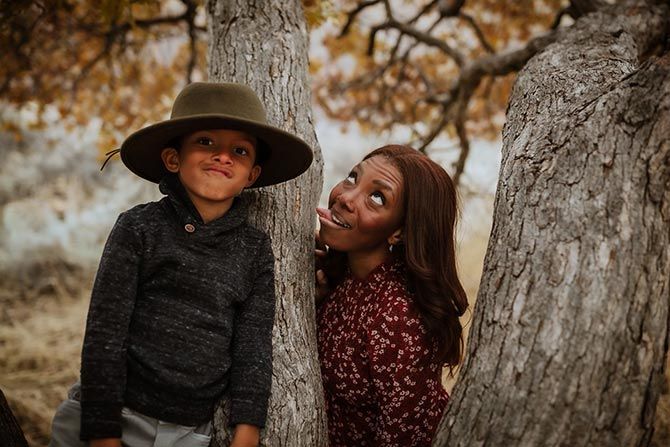Dr. Erica Baiden immigrated from Ghana with her family when she was a young child and values the traditions of her ancestors. She was raised by her single, incredibly loving and resilient mom and by the support of loving multigenerational family members in Brooklyn, NY.
Growing up, Dr. Baiden knew well the life of a latchkey kid but did not know of her mother’s silent suffering. After a series of life-shaping events, including witnessing the debilitating effects mental illness had on her mother, Dr. Baiden was forced to move to Ogden, Utah. She has since been motivated to serve marginalized, under‑resourced and vulnerable populations and treat them in ways that restore dignity and respect.
Dr. Baiden is a proud alumna of Weber State University where she had the honor to be mentored by the late and beloved professor Kent Van de Graaff, PhD. His words, “If it is to be, it is up to me” instilled the confidence that allowed Dr. Baiden to matriculate at the University of Utah School of Medicine and, later, the University of Utah Family Medicine Residency program.
Dr. Baiden worked at Granger Medical Clinic where she served as a primary care provider, Family Medicine Department Chair, piloted a Behavioral Health Collaborative, served as adjunct faculty with the University of Utah and sat on various boards. She has shared her voice of community advocacy and education through webinars, podcasts, panels and other events with Black Physicians of Utah. She now works in an interdisciplinary practice at the University of Utah Intensive Outpatient Clinic (IOC).
Dr. Baiden regards family medicine as the backbone and pillar of medicine. The opportunity to foster special relationships with patients, engage in advocacy and policy change, and the expansive scope of practice are some of the aspects of family medicine that keep her motivated. The integrative model of the IOC embodies these values. This not-for-profit practice uses an interdisciplinary team approach to serve some of the most vulnerable people of the Salt Lake Valley and beyond. The IOC team creates an emotionally and physically safe space that protects patients from being further pathologized and marginalized for societal issues. And as a result, improved health outcomes are achieved.
Dr. Baiden believes that representation is also important to improve health care outcomes. She believes that when a variety of persons enter medicine, family medicine specifically, unique and shared experiences question current standards and improve quality of care. The medical climate 20 years ago, when Dr. Baiden first entered medical school, was obviously different than it is today. However, the intersectionality of her experience is something that is still shared among other women and women of color in medicine. This demographic of current and future physicians faces internal and external obstacles of doubt; every move or thought is scrutinized and accomplishments are questioned. There is an ever-present awareness of bias against your gender or race and resultant internal and external pressure to work harder in order to disprove harmful tropes. This awareness may affect performance or be the driver of overcompensation in order to be taken seriously.
This is especially prevalent in professional environments where there is little to no representation or mentorship. Where is the safe space or person to help challenge and reframe these narratives? How does one navigate the complexities of self-doubt vs. being made to feel as if your identity deems you insufficient to warrant your accomplishments and title?
Though there has been a growing commitment to foster inclusivity and diversity in the workplace and academic centers, Dr. Baiden feels that there is more active work to be done. This includes changes in medical student and resident curricula and engaging allies. She also believes it important to be cautious not to further and unfairly task BIPOC and other marginalized professionals with educating and improving outcomes of systemic inequities they did not create. She has been grateful for the many allies she has met along the way who have helped establish a sense of belonging and acceptance. She credits this community for making Utah feel like home.
Another group, Black Physicians of Utah (BPOU), has been instrumental in fostering community and fellowship for Dr. Baiden. BPOU was founded by Richard Ferguson, MD, MBA in 2021. Dr. Ferguson had the foresight to fill a desperately needed void in mentorship, advocacy, and access. Many BIPOC and marginalized people, professionals included, have experienced pressures to bear a mask of conformity. Part of BPOU’s mission is to create a safe space where self-censorship is not required and racialized health inequities are eliminated. Dr. Baiden looks forward to helping extend BPOU’s mission and vision into the broader under-resourced Utah community.
As mentioned prior, Dr. Baiden believes that family medicine is the backbone of medicine and a needed sounding board of community advocacy and population health. Fewer medical students are choosing family medicine and experienced physicians are retiring early. This shortage of family medicine physicians means limited access to care, worse health outcomes, and a less efficient healthcare system. This disproportionately affects marginalized communities. How do we address this silent and looming public health crisis? Dr. Baiden believes that legislative, payer, and academic bodies should recognize the rising expectations, administrative burden, and limited resources many FM physicians experience and increase support of FM physicians financially and beyond. This can include a multidisciplinary team approach to healthcare delivery, reducing the burden of paperwork, encouraging FM residents and FMIG students to engage in community mentorship opportunities, and increasing the number of BIPOC providers.
This issue is complex and multifactorial and will take a collaborative effort to address. Nonetheless, Dr. Baiden finds the field of family medicine extremely rewarding and still finds time to spend outdoors hiking, glamping, cycling, gardening or climbing. But most of all, she enjoys karaoke dance parties at home with her son, her greatest teacher and joy.








